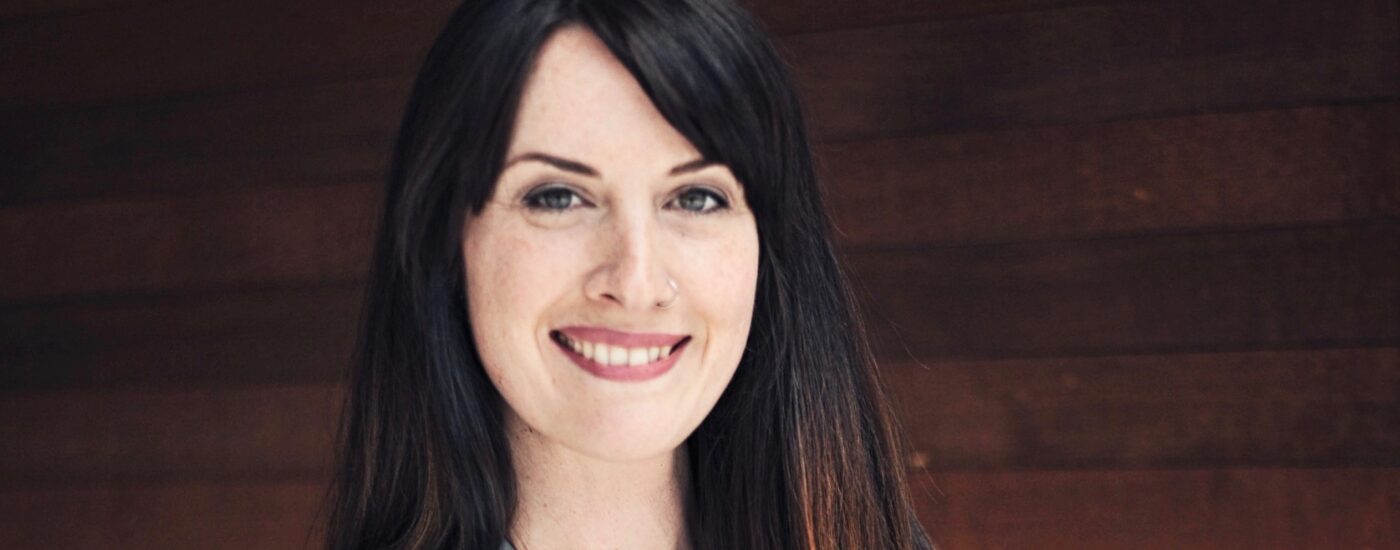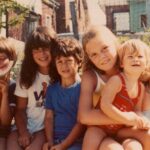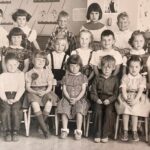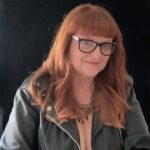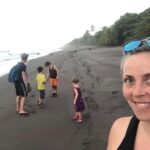Today we raise our fists high and put our hands together in celebration of our Feature Girl Warrior, the compassionate and wise End-of-Life Doula Chelsea Peddle, founder of CircleSpace, a warm and engaging space to reimagine death as a normal part of the lifecycle. It is here that Chelsea helps individuals, families, communities and businesses feel empowered and prepared for end-of-life through education, coaching and consulting services. Her unique approach and toolkits provide customized roadmaps through health, legal, financial and personal planning resources. Chelsea was drawn to this extraordinary profession because she believes everyone deserves comfort and quality end-of-life care, and she loves being a part of peoples’ lives during this transformative time. Death has always been a pivotal part of Chelsea’s life and working in this field reminds her how truly precious life is. When Chelsea we 16 years old, her father was diagnosed with a glioblastoma brain tumor. In that moment, her world changed. She watched him undergo grueling treatment and it was during that time that she learned how to “do death well” by watching her mother mindfully tend to her family and guide them through his dying and death. The reality of her own mortality haunted her for many years after his death, but over time she transformed her fears into empowerment. Today, as a mother of two little ones, Chelsea is energized by helping people move through the fear and silence that surrounds death. Her world changed again in April 2019 when her mother was also diagnosed with a glioblastoma brain tumor. At first she reeled from shock but in the midst of this enormous pain, she found deep gratitude. She knew the landscape that she and her family were being thrust into – the emergency room, hospital admission, Cancer Centre visits, community and private homecare, and Hospice. Through it all, Chelsea held space for her mother and family to grieve together, laugh together and mark important milestones until they gradually let go of this life. Chelsea has seen first-hand how being prepared for dying and death can ease suffering and lighten a family’s grief. She knows how important it is to have a well-composed advance directive so your healthcare wishes are honored. Preparing for end-of-life takes courage, time and energy. It can also be one of the most rewarding experiences of your life and the greatest gift you give your loved ones. Chelsea has an End-of-Life Doula certificate from Douglas College and is a member of the End-of-Life Doula Association of Canada. She also has a Masters Degree in Education from the University of British Columbia and a Certificate in Human Rights Education from Equitas International Centre for Human Rights Education in Montreal.
What makes you a Girl Warrior?
My resilience. My willingness to find lightness, love, and connection even in difficult times.
My name, “Chelsea,” means a harbour. As a kid, I thought that was so boring! At the time I didn’t understand a harbour’s purpose, which is to shield vessels from stormy waters and to welcome people to new shores. Looking back on my career and personal life, I see now that my name was actually quite prophetic. In every role, I’ve held space for diverse people to come together to create more equitable relationships and communities. Now, in my role as an end-of-life doula, I hold individuals and families through very difficult times.
How did your father’s diagnosis of glioblastoma brain tumor change your life?
Like many teenagers, I thought I was invincible. At 15 years old, I had a great group of friends, I had found my passion in local theatre and I thought my family and my world were completely safe. That bubble popped when my dad was diagnosed with an extremely rare and aggressive form of brain cancer. The change happened quickly: over 10 months I went from being a carefree kid to visiting my dad in the ICU as he recovered from brain surgery, watching him undergo grueling radiation and chemo therapy and sitting with him in Hospice as he was dying. That’s a lot to ask of an adult let alone a teenager. Thankfully I had my mum to guide me through everything and the knowledge that my step-mum was caring for my dad.
My dad’s diagnosis was an abrupt end to my childhood. Through my limited teenage perspective, I learned that bad things can happen to good people. I didn’t understand why this was happening to me and to my family. What had we done to deserve this? A sense of dread and an ever-present alert to danger settled in to my heart and bones.
Many years later, when my elderly Gran was dying, I was once again shepherded by my mum through this difficult time. As the circle of my Gran’s life slowly became smaller, my mum honored her by preparing her favorite meals (even if my Gran could only manage a taste). My mum arranged tea parties in the garden under the blooming crabapple tree, Gran wrapped in soft blankets to keep out the spring chill. Mum encouraged me to read Shakespeare to my Gran as she rested on the couch. And my mum arranged one last family trip to the Beacon Drive-In for ice cream before my Gran, like my dad several years before, entered Hospice.
Through this experience I began to let go of some of the pain of my dad’s death and to accept the reality of our mortality. I began to see the dying process as an opportunity to deepen connection. To celebrate life and its ending.
Years later your mother was also diagnosed with the same illness as your dad. Unimaginable tragedy, yet you felt deep gratitude in the midst of your pain. Where did you find joy in the sorrow?
At the moment my mum received her diagnosis it was like an invisible string tethered us together, my sister, too. At the time I couldn’t explain what the magic was that was anchoring us. I remember saying to my mum, “We’ll do this together.” And we did. I realize now, that magic, that string, was all the work we had done over our lifetime to prepare for this moment, unexpected as it was. I knew what my mum’s medical care wishes were, I had a copy of her will. I understood her values and what was most important to her. We had laid the foundation for open communication so that when the hammer of a terminal diagnosis hit us, we didn’t crack. I always say that your future self will thank you for doing the work now. I’d never been so grateful to my younger self and to my mum for having the foresight and the skill to prepare us so well. We’d done the work so we were free to simply be with each other and to focus on saying goodbye in a fitting way.
Amid the chaos of her illness we found many moments of joy. It was simple really. We re-watched old Hollywood movies, ate our favorite foods, did special projects with the grandchildren to help them mark this time and all the changes. We laughed and we cried. It was hard as hell. And it was beautiful.
What and who were you thankful for the most during that time?
My twin sister. Talk about a Girl Warrior: she was 38 weeks pregnant with her second child when my mum was diagnosed. My sister was my constant companion, sharing in all the family caregiving, traveling back and forth from the Mainland every couple of weeks, sometimes every few days. Her capacity to care for her newborn, to share the job of caring for my mum and to be so loving, and present, was other-worldly.
How do you let go of a loved one with grace, particularly if their time on earth was cut short? How do you get past the anger or feeling of injustice?
I’m not sure that I’ll ever get past the feelings of anger or injustice. But I’m confident that over time and with work, those feelings won’t take up as much space. That the beauty and joy of my life will grow around my grief to make those feelings smaller. And that feels ok for me.
The question that plagued me when my dad died was, “Why me? Why did this happen to my family?” And I still ask myself those questions, now that my mum has died from the same rare disease. I mean, come on Universe! When I feel myself going down that emotional rabbit-hole, I try not to push it away. Instead, I’ve learned to sit with it and to name what I’m feeling: “I’m devastated. I miss my mum. Why do my friends have both their parents and I have none?” I try to accept those feelings, as hard as they may be, because I know that this state is temporary and that it’s essential to air these emotions out, how ever many times they need to be aired.
When I’m feeling overwhelmed by it all, I try to shift the question from “Why me” to “Why not me?” The circumstances of my parent’s deaths may be unusual, but they are not abnormal. We are all destined to die. We aren’t entitled to a specific amount of time on this earth. Nothing has been stolen from me, or my parents. We don’t know when or how we will die, but we do know it will happen one day, maybe sooner than we’d like.
That may sound a bit intellectual, and I agree, especially when I’m feeling the fear of death, pain and grief so viscerally. But shifting away from the belief that I’ve been unfairly treated is actually a gift to myself. It doesn’t feel good to think the Universe has it out for me or that I’ve had more than my fair share of suffering, because that simply isn’t true. So, I try to have self-compassion. I let myself ride the rollercoaster of grief while also focusing on the things I can control, like preparing emotionally, spiritually and pragmatically for my own death and living the life I will be proud to look back on from my death bed.
People tend to be uncomfortable talking about death. With CircleSpace, you’ve created a safe space for people to have those difficult conversations. What are the biggest challenges or obstacles you face?
My biggest challenge, and I think this is true for end-of-life doulas in general, is that people don’t know that we exist! Historically, caring for people who are dying was a normal part of family and community life. Over time, we’ve lost this role by moving death further away – it’s been exported to hospitals, residential care facilities, funeral homes etc. In general, these advances have improved our quality of life. But it’s really been at the expense of knowing how to approach our own death and the death of our loved ones with connection, dignity and grace.
Many families are paralyzed when a loved one is faced with a serious illness or a terminal diagnosis. How do we prepare our affairs so our loved ones aren’t left with a mess? What does the dying process look like and how can we make plans for care, comfort and support through that process? How do we want to be remembered? What wisdom do we want to pass on? How do family caregivers care for themselves as they take on the monumental job of caring for their loved one? And most importantly, how do we start these conversations when many people want to deny that death is even on the horizon? This is where end-of-life doulas can help.
The daughter of a client recently said that she was amazed at how helpful it was to have me, an impartial and supportive third-party, facilitate these conversations with her family. She was in awe at how much more candid and clear her loved one was about their wishes when I was the one asking the questions. My support allowed them to connect in ways they didn’t think possible and released much of the pressure.
What do we need to know “for sure” about being an End-of-Life Doula?
End-of-life doulas are non-medical professionals trained in end-of-life care who are an integral part of family’s care team. We offer comfort, information and guidance through illness, dying and death with emotional, physical, spiritual and practical support. We help with things like advance care planning, legacy projects, guidance for wrapping up your affairs, helping children prepare for the death of their loved one, navigating to health care and other supports, and facilitating conversations with friends and family.
End-of-life doulas also work with people before a health crisis – in fact this is the best time to start! We help people prepare their affairs in advance and think about how they’d like to be treated as their life completes. Doing this work while healthy is an amazing opportunity to find gratitude for the life you are living and to lay the foundation so that you and your family are ready when the time comes.
What’s the most important life lesson your Mom taught you?
I was bullied in elementary school and when things were particularly bad my mum would take the day off work to stay home with me for a “mental health day.” Pretty progressive for the ‘80s! To this day I recognize the importance of prioritizing mental health and truly listening to kids when they say they are having a hard time.
On one of those days I was feeling sad and questioning why this was happening to me (I see a theme…). As we cuddled, she told me she believed that I was destined to be a teacher in some way and that I would protect others from experiencing the same hurts that I had. In that moment, she planted the seed of social justice in me and taught me to use my powers – both the strength and the vulnerability – for good.
Through your mom’s death you helped your young daughters understand the cycle of life. For those of us with young children, what do we need to know to enable these meaningful conversations without making them fearful or anxious about their own mortality?
They key is to start these conversations early and to have them often. The aim is to normalize talking about life and death before a crisis so that you’ve laid the tracks for open conversation with your kids. Books are a great way to explore themes of life, death and change in a safe way. Include them in your collection now, don’t wait until someone is sick. There are many lists of age-appropriate books online or ask your local library for help.
Another tip is to use accurate, simple language. Just like we use anatomically correct language when talking about our bodies, we need to use the appropriate words when talking about death and illness. Saying things like, “Grandma is sleeping” when she has died can be very confusing and may even make a child fearful of sleep. Kids minds often imagine the worst if we aren’t clear. There are many other ways to support children to become death-literate and to process the grief of losing a loved one. The priority is being loving, honest and present with them.
What would you say to your younger Girl Warrior?
You are loved.
What would you say to future Girl Warriors looking for inspiration?
Find what makes you “you” and feed it! The world needs your gifts.
Who is/are your Girl Warrior hero(s) and why?
My mum, absolutely. She taught me how to be in this world and about my responsibility to my community. Also, I’m honoured to be surrounded by an army of Warrior Girls. The community that gathered around me and my sister when my mum got sick was awe-inspiring. “The circle of women around us weave invisible nets of love that carry us when we are weary and sing with us when we are strong.” SARK
Blue Sky it. No boundaries here, just limitless opportunities. Where do you see yourself in 5 years?
I’d love for every person who receives a life-limiting diagnosis to have the opportunity to be supported by an end-of-life doula. In 5 years, I’d be thrilled to be working in a team environment with physicians, palliative care providers, nurses etc., to wrap support and care around people who are ill or dying – and that this is the norm.
What makes you laugh uncontrollably? Cry out all the tears?
My sister and our friends, Layla, who is really more like our triplet from another mother, and Saskia. Nothing like good belly laughs and deep sobs with your best girlfriends who’ve know you all your life!
If a bioflic were written about your life, what would it be called?
Laughter Through the Tears!
To learn more about end-of-life preparation, head over to CircleSpace: Empowered End-of-Life Planning at: www.circlespace.ca
Follow CircleSpace on Facebook at: https://www.facebook.com/CircleSpaceCommunity/

